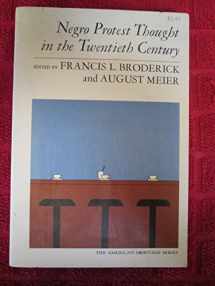
Negro Protest Thought in the Twentieth Century.
ISBN-13:
9780672600883
ISBN-10:
0672600889
Author:
August Meier, Francis L. Broderick
Publication date:
1966
Publisher:
Bobbs-Merrill Co
Format:
Paperback
443 pages
FREE US shipping
Book details
ISBN-13:
9780672600883
ISBN-10:
0672600889
Author:
August Meier, Francis L. Broderick
Publication date:
1966
Publisher:
Bobbs-Merrill Co
Format:
Paperback
443 pages
Summary
Negro Protest Thought in the Twentieth Century. (ISBN-13: 9780672600883 and ISBN-10: 0672600889), written by authors
August Meier, Francis L. Broderick, was published by Bobbs-Merrill Co in 1966.
With an overall rating of 4.4 stars, it's a notable title among other
books. You can easily purchase or rent Negro Protest Thought in the Twentieth Century. (Paperback) from BooksRun,
along with many other new and used
books
and textbooks.
And, if you're looking to sell your copy, our current buyback offer is $0.43.
Description
This book is part of The American Heritage Series. The author is Francis L. Broderick who at the time of the publication of this book was Dean of Lawrence and Downers Colleges. He served as Director of the Peace Corps in Ghana from 1964-1965. His previous publications include W.E.B. DuBois: Negro Leader in a Time of Crisis and Right Reverend New Dealer: Monsignor John A. Ryan. The other author, August Meier, was Professor of History at Kent State University. He was a specialist in Negro history and race relations and contributed widely to scholarly journals and is the author of the definitive Negro Thought in America, 1880-1915. Related books in this series are Slavery in America by Willie Lee Rose, The Antislavery Argument by Jane and William Pease, The Radical Republicans and Reconstruction, 1861-1870 by Harold M. Hyman, and Nonviolence in America: A Documentary History by Staughton Lynd. This volume is confined to expressions of Negro thought and to documents that presented reflections on "the way out", and not merely the facts of inequality. Of necessity, the emphasis is on the programs and platforms of those organizations that have spoken for the Negro; inevitably a number of famous figures have been omitted. The selections are drawn for the most part from the little-known material that too often is lost to the historical record: convention speeches, the declarations of conferences, pamphlets and articles in magazines of small circulation, occasional confrontations in interviews and debates - whatever serves best to present a representative point of view.


We would LOVE it if you could help us and other readers by reviewing the book
Book review

Congratulations! We have received your book review.
{user}
{createdAt}
by {truncated_author}


